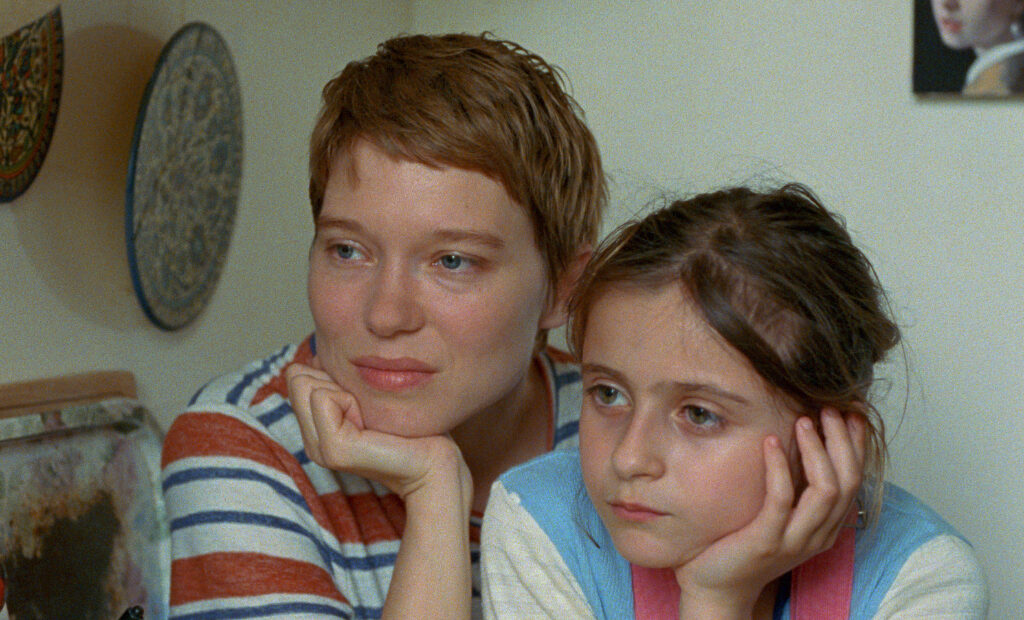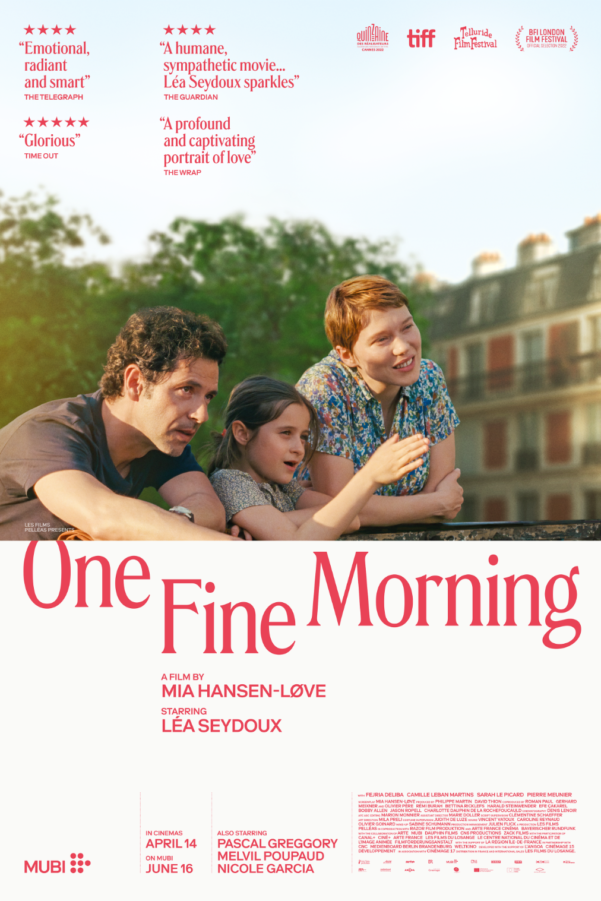“The best reward I can get from my films is when I see people touched”: Léa Seydoux on One Fine Morning

One Fine Morning from writer-director Mia Hansen-Løve, stars French actress Léa Seydoux as single mother Sandra who is drawn into a passionate affair with married man and father Clémont (Melvil Poupaud), while in tandem carrying the weight of her father’s ailing health due to dementia. Stripped-back, both in the sense of its simple narrative and in its dedication to realism, Seydoux’s winningly naturalistic performance gives this story an incredibly moving, empathetic and relatable heart, while a dose of dark humour reminds us all that joy can be found in the most unlikely of places.
The Upcoming had the chance to hear from the film’s star during Cannes Film Festival 2022, where she shared her thoughts on how we deal with death, her experience of working with Hansen-Løve and what acting as a job and career means to her.
Do you think there should be classes about what to do when people die? Nobody ever tells you.
Léa Seydoux: Oh, yeah – nor about many other things, as well. But, no, I think that the class is life: you learn when you live.
You share a great chemistry with the actress who played your daughter. How did you two develop this lifelike mother-and-daughter relationship?
LS: Oh, it was just… she’s a bit cheeky. I really liked her. She was not an actress, so it was her first film, which was good because she was just very natural. And I think that was what we wanted.
You’ve said it was a real privilege to play a “normal woman”. Can you expand on that reflection a little? Is it because we are used to you playing very complicated roles?
LS: It’s funny because it’s the first time I play a normal woman. That’s why I think that people can relate to her. Because I’ve done some films where the character was so complicated, it didn’t really help people to be really connected. It was nice to be…. it’s just a simple story. She goes through emotions that we’ve all experienced. I think I also make films to touch people, that’s the main thing. I’m not doing films for myself, I make films for people. And what I love, the best reward I can get from my films, is when I see people touched, to help them to just feel things, understand things and experience, also, something about themselves. And it’s exactly what it does to me when I watch a film that I like, and I’m like, “wow”, then I feel that I have a connection. I think cinema in a way helps me to live. Like when you read books, also. Cinema is not the only thing: you have books and painting, music, everything that connects you to your life and your emotions. It’s just that for me.
Mentioning books, they are a key element in the film, as Sandra doesn’t want to keep her father’s books, but they were his life.
LS: Oh no, she’s interested! She says, “Can you keep the books for me?” because she doesn’t have any space. She has a tiny apartment. But she wants to keep the books. She says to her mother, “Don’t throw out the books” because they are important to her.
What is your own relationship with materialised memories of life? Do you keep souvenirs? How close are you to such objects?
LS: I am very attached! I am a bit nostalgic for sure, especially when it’s a gift – someone that I love gave me something. Really, I cherish objects. Yes, I do. It’s something I have a real attachment to; I don’t need them, but it’s just something that I like to be surrounded by, objects that have belonged to my family or to my friends. It’s a piece of someone else with you.
Did you envy your character in a way that she’s so grounded and “normal”, living a homely life?
LS: Because you think she’s grounded? Yes, she’s home, but her husband died and her father is sick. And she’s in love with someone who’s not available. I think she has struggles. It’s funny to think about envying, because we often think, in my opinion, that when we see other people, we fantasise about them, “Oh, they must be so happy.” Life, it’s much more complex than it seems to be. Even me – sometimes people tell me, like, “Léa, you’re so lucky. You are an actress, you’re successful. You have a lovely home” and everything. And sometimes… I mean, we all struggle. My personal feeling I have is that I always try to be on the side of life. Even if sometimes I can feel very desperate, I try hard to just be connected to life.
You mentioned the story being simple. Would you say that in some ways this is the most difficult thing for an actor to be?
LS: I think, for me, when there is truth, when I see and feel the truth, it makes things easier in a way because they are real to me. When I have to act something that is bigger than life or a situation, that is more difficult for me maybe because it’s hard to be connected to it. But that’s the thing: you have to try to find the truth, even in things that are like… I guess I’ve never played a superhero, but if you play a superhero, you have to find a certain truth. I’m always afraid, when I make a film – I’m afraid that people will not connect to what I’m doing, will not relate, you know? Because what I want is people to feel emotions. That’s the reason why I do this job: It’s what I love, I love to give to people those emotions. It’s funny, because it’s true it’s the first time that I play a normal person, in a way. And I’m not normal, I’m not normal at all! So it was a kind of composition for me. It’s true. I mean, my life is not normal, because of the job that I’m doing, it’s a bit extraordinary – it’s not a common job. But I feel like, also, I have connections with this character. I really had a huge empathy for her. And when I read the script, I was very moved by what she’s going through, and I love how subtle and in a very elegant way Mia just displayed the story.
What was it like working with her? Vicky Krieps has said she’s very strict!
Léa: Very true. She’s very strict. There is no improv, she loves to do many takes, she’s very, very structured. She’s very demanding, actually. But you don’t see the craft. And that’s good, when you don’t see the craft.
Is your experience working with a female director different from working with a male director?
LS: Yeah, it’s different to work with a female director because usually, [with male directors], I am more their alter ego, it’s otherness. I guess, when you’re a man, it’s more like a vision – you have a vision of a woman. I’m fine with it, as well, it’s just something else. It’s another point of view, and it’s interesting. But it’s true that what I love – whether it’s male or female director – what I love is to collaborate. I love to feel that I write the film with the director. With Mia, I felt that we wrote the movie together, even though she was tough; I think that I came up with ideas and she took them. I love the feeling that, when you’re an actor, you are co-writing the movie with the director. And that’s the reason also why I think we won the Palme D’Or for La Vie d’Adèle (Blue Is the Warmest Colour), because the jury thought that we were as equal as the director and that we also deserved the Palme D’Or because the movie was really based on us. That is very satisfying. I love to feel that I collaborate and not be under someone’s authority. I don’t like authority.
A striking aspect of the film is that Sandra is going through a period of grief and falling in love at the same time, which could be jarring, but it’s not. Furthermore, in moments that should be depressing, people are laughing and telling jokes – in particular, the mother is very witty in dark situations. That seems to capture something that’s true about life: when you’re going through deepest grief, you can actually feel joy. And so, despite there being tragedy, there’s some real optimism in the film.
LS: Exactly. It’s true. When we experience death, in a way, we feel even more connected to life. Because it goes together. I mean, life wouldn’t exist without death and death wouldn’t exist without life. So when you have immense sorrows, on the other end, you feel very much alive. That’s also what the film’s about.
How do you feel about negative reviews? When you put so much energy into a role, such as with The Story of My Wife, but the critics aren’t supportive, how do you feel?
LS: It’s so funny because I love that movie. The Story of My Wife, for me, it’s maybe the best film I’ve ever done. It’s so crazy to see the critics didn’t like it – though they were mostly American, it’s true. But I love that movie. And when it came out in Paris, I received so many messages about the movie; people were extremely touched by the film, and I even received, for the first time in my life, messages from Catherine Deneuve! She wrote me a message and said that she loved the movie, that she was so touched. And I was like, “Wow.” I think it was misunderstood when it came out, but I’m still very attached to that film. And now, I’ve seen that the reviews for this film [One Fine Morning] are great, especially from the foreign critics. But the French are good, too – but it’s been, like, unanimous. Like, I’ve seen that. But, of course, I’m very happy when the critiques are good. I’m really happy. But if they’re not good, it’s okay, because I don’t make films for this, I don’t have this relationship with cinema. I don’t have, I would say, a capitalistic relationship. It’s not like, “Yes, I want to make money out of my films.” I’m not a businesswoman, I’m an actress, and I do films for people, for people to be touched. And that’s the only thing. And, really, when I do a film, I put my heart into it – I put everything I can, I do it the best I can. Sometimes it works, and sometimes there are parts where maybe it works more or less. I give something and then I accept the idea that it doesn’t belong to me anymore: it’s something that I give. Cinema is not like theatre, for example. It’s not something that you have to do again and again. You do it once, that take, that scene, and you will never do that scene again in your life. You have to be in the present moment, which is something also that I really like. So I do it, and once I’ve done it – and sometimes I’m unsatisfied about what I did, like, “Oh no, I should have done it this way” – it’s like: it’s over now. Next.
Can tell us anything about the Emmanuelle project?
LS: Yeah, I’m really excited about the film, and I’m ready to explore the female nature. What it is to be a woman today… I think it will be about a woman of nowadays, a portrait of a woman.
What was it like working with David Cronenberg on Crimes of the Future?
LS: I loved working with David. I loved him as a person – he’s very funny, very smart. And he’s very alive. He’s like a kid. It was very inspiring. And I think… we just had fun. We really had fun.
Sarah Bradbury
One Fine Morning is released in UK cinemas on 14th April 2023 and available on MUBI on 16th June 2023. Read our review here.
Watch the trailer for One Fine Morning here:
























Facebook
Twitter
Instagram
YouTube
RSS